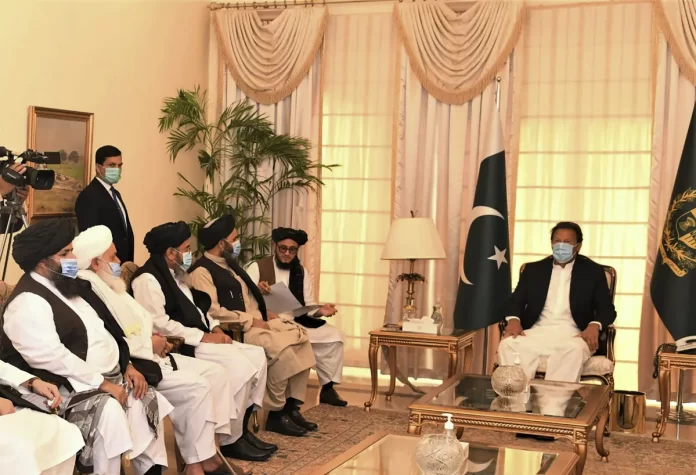By Ajay Kaul
New Delhi: Just over a year ago, Pakistan was celebrating seizure of power by extremist terrorist group Taliban in Afghanistan but now it has only bitterness to highlight.
The friends and brothers of yesterday have become enemies, with the relations between the two neighbouring countries witnessing sharp deterioration.
Not only are their forces clashing at the border frequently, even the diplomats of Pakistan are finding it unsafe to be in Afghanistan.
Clearly, the euphoria in Pakistan, witnessed after the Taliban militarily took control of Kabul in August 2021, has evaporated and given way to serious security concerns.
There were celebrations in Pakistan when the Taliban overthrew an elected government of Ashraf Ghani in Kabul, with the then Prime Minister of Pakistan Imran Khan saying that the Islamist militia had “broken the chains of slavery”.
Pakistan had clandestinely extended military and other forms of support to the Taliban in its campaign to grab power and was under the impression that Islamabad would continue to patronise the fanatic Islamist regime of Kabul.
However, that was not to happen and what we see today is acute toxicity in the relationship between Pakistan and the Taliban-ruled Afghanistan.
In the last several weeks, the forces of the two countries have clashed a number of times on the border, resulting in several casualties and flaring up of tensions.
The reasons for the confrontation are broadly two.
Firstly, the Taliban does not recognise the Durand Line as the border between Afghanistan and Pakistan and wants its writ to run, especially the implementation of Sharia rules, in the Pashtun-dominated Khyber Pakhtunkhwa region of Pakistan.
Secondly, Pakistan blames the Afghan Taliban of being behind terrorism in Pakistan through Tehreek-i-Taliban Pakistan (TTP), which recently ended ceasefire with the Pakistani forces and announced its intentions to carry out attacks across the country.
TTP has said it ended the ceasefire because of severe oppression carried out by the Pakistani forces against the Pashtuns in Khyber Pakhtunkhwa and elsewhere.
The increasing confrontation with Afghan-ruled Taliban and the corresponding escalation in TTP attacks have created massive security concerns for Pakistan.
The TTP, whose cadres are known to be highly motivated and battle-hardened warriors, has already carried out a number of attacks in Pakistan over the last few weeks.
The latest attack was carried out in Pakistan’s capital Islamabad on December 23 when a car bomb explosion killed a policeman and injured two.
A few days prior to that, TTP cadres, lodged in a key Counter Terrorism Department (CTD) unit in Bannu in Khyber Pakhtunkhwa, seized control of the complex on December 19. They freed several prisoners and held hostage a number of security personnel for about 60 hours.
The TTP is also adding to its muscle by roping in other groups inimical to the Pakistani establishment.
According to a TTP statement, a Baloch militant group led by Mazar Baloch from Makran in Balochistan joined the outfit two days back for joint action against Pakistan.
Amidst the mounting worries for the Pakistani establishment, a video has surfaced on social media, showing a lone TTP activist pointing towards the National Assembly (Parliament) complex from a high-rise location and showing a chit with a written message ‘We are coming’.
Meanwhile, the border, especially Chaman crossing point, remains volatile.
Recently, the forces of the two countries resorted to heavy artillery shelling, in addition to the gunfire, which left several people dead.
For some time, the Chaman border, a key point for trade and travel, was closed in the wake of escalation in firing and shelling.
The trigger for the latest cross-border firing and shelling was the strong objection by the Taliban to fencing of the border by Pakistan.
Since Taliban does not recognise the border with Pakistan, its forces keep removing barriers put up by Pakistan at various points of the boundary.
Pakistan wants to fence the 2,400-km-long border to stop easy movement of Pashtun living on either side.
However, the Taliban believe the fencing would formalise the border between the two countries, which is not acceptable to them as they consider Khyber Pakhtunkhwa as part of Afghanistan because of religious and ethnic similarities.
Even as the border remains volatile, Pakistan’s presence within Afghanistan has been under threat.
On December 4, a lone gunman fired shots at Pakistan’s Acting Ambassador Ubaid-Ur Rehman Nizamani when he was taking a walk within the Embassy compound in Kabul. The diplomat survived while a Pakistani security man guarding him was killed in the attack.
The attack was claimed by the ISIS but Pakistan suspects the involvement of TTP, which is supported by the Afghan Taliban.
Naturally, the attack led to questions over the ability, or intent of the Taliban, to provide security to the diplomats of Pakistan, which is the only country to recognize their rule.
Even the interests of Pakistan’s ‘all-weather friend’ China are not safe anymore in Taliban-ruled Afghanistan.
On December 12, days after Pakistan’s envoy was targeted, gunmen attacked a hotel in Kabul mostly used by the Chinese nationals, including businessmen.
Although none of Chinese nationals staying there lost his life in the attack, two of them sustained injuries while trying to escape by jumping down the building.
The attack, again owned by the ISIS, was a shocker for China, which asked its citizens to leave Afghanistan immediately because of the unsafe situation.
China, with active involvement and support of Pakistan, has been keen to expand its footprint in Afghanistan ever since the US-led forces left and the Taliban took power in the war-ravaged country.
It has not recognized the Taliban regime but has full diplomatic presence in the country.
The developments of the recent weeks seem to prove what former US Secretary of State Hillary Clinton had told Pakistan 11 years back: “You can’t keep snakes in your backyard and expect them to only bite your neighbour.”






